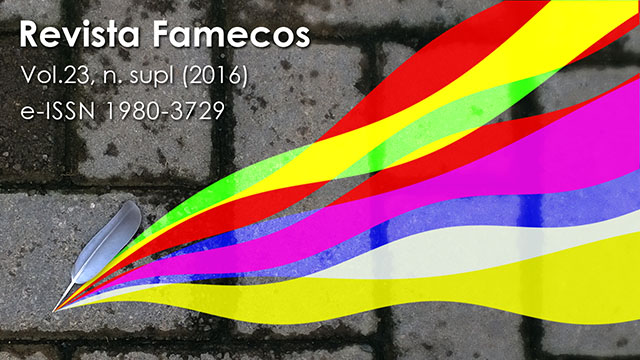The Portuguese narratives about shipwrecks and the text literary journalism
DOI:
https://doi.org/10.15448/1980-3729.2016.s.24898Keywords:
Navigation reports, Shipwrecks, Literary journalismAbstract
Between the sixteenth and seventeenth centuries, the Portuguese practically dominated the world routes of navigation. Embarking and living – somehow – related to overseas travel was not for a few. Instead. It was for many. The population of Portugal at that time, about 1.5 million people – 280,000 earlier and 360,000 at the end of the century – about 25% walked or were shipped directly involved in the business of shipping. This paper analyzes three tragic-maritime reports between 12 collected by Gomes de Brito. The choice is because they have a direct relationship with Brazil. As discussed below, the selected texts – dealing with pain, fear, death and survival – have journalism evidence, such as objectivity, clarity and information. At the same time, contain essential ingredients of literary journalism as subjectivism, literary strategies, detailed scenes and environments and the relationship between reality and fiction. All, however, it seems to make true the narratives. And believable fiction.
Downloads
References
BRITO, Bernardo Gomes de. História trágico-marítima. Rio de Janeiro: Lacerda/Contraponto, 1998.
CASTRO, Gustavo de; GALENO, Alex. Jornalismo e literatura: A sedução da palavra. São Paulo: Escrituras, 2005.
COSSON, Rildo. Romance-reportagem: o império contaminado. In: CASTRO, Gustavo de; GALENO, Alex. Jornalismo e Literatura: a sedução da palavra. São Paulo, Escrituras, 2005.
HUTCHEON, Linda. Poética do Pós-Modernismo: história, teoria e ficção. Rio de Janeiro: Imago, 1988.
LIMA, Alceu Amoroso. O jornalismo como gênero literário. Rio de Janeiro: Agir,1969.
MADEIRA, Angélica. Livro dos naufrágios: Ensaio sobre a História trágico-marítima. Brasília: UnB, 2005.
MALERBA, Jurandir (Org). A História Escrita: teoria e história da historiografia. São Paulo: Contexto, 2009.
OLINTO, Antonio. Jornalismo e Literatura. Rio de Janeiro: Tecnoprint, 1970.
RESENDE, Fernando. Textuações: ficção e fato no Novo Jornalismo de Tom Wolfe. São Paulo: Annablume Fapesp, 2002.
SCHAFF, Adam. História e verdade. Lisboa: Estampa, 1974.
SILVA, Juremir Machado. O que pesquisar quer dizer. Porto Alegre: Sulina, 2010.
______. O que escrever quer calar?: Literatura e jornalismo. In: CASTRO, Gustavo de; GALENO, Alex. Jornalismo e literatura: a sedução da palavra. 2. ed. São Paulo: Escrituras Editora, 2002. p. 47-51. (Coleção Ensaios Transversais).
VEYNE, Paul. Como se escreve a história: Foucault revoluciona a história. Brasília: Universidade de Brasília, 1982.
WHITE. Hayden. Enredo e verdade na escrita da história. In: MALERBA, Jurandir (Org). A História Escrita: teoria e história da historiografia. São Paulo: Contexto, 2009.
Published
How to Cite
Issue
Section
License
Copyright
The submission of originals to Revista Famecos implies the transfer by the authors of the right for publication. Authors retain copyright and grant the journal right of first publication. If the authors wish to include the same data into another publication, they must cite Revista Famecos as the site of original publication.
Creative Commons License
Except where otherwise specified, material published in this journal is licensed under a Creative Commons Attribution 4.0 International license, which allows unrestricted use, distribution and reproduction in any medium, provided the original publication is correctly cited.






